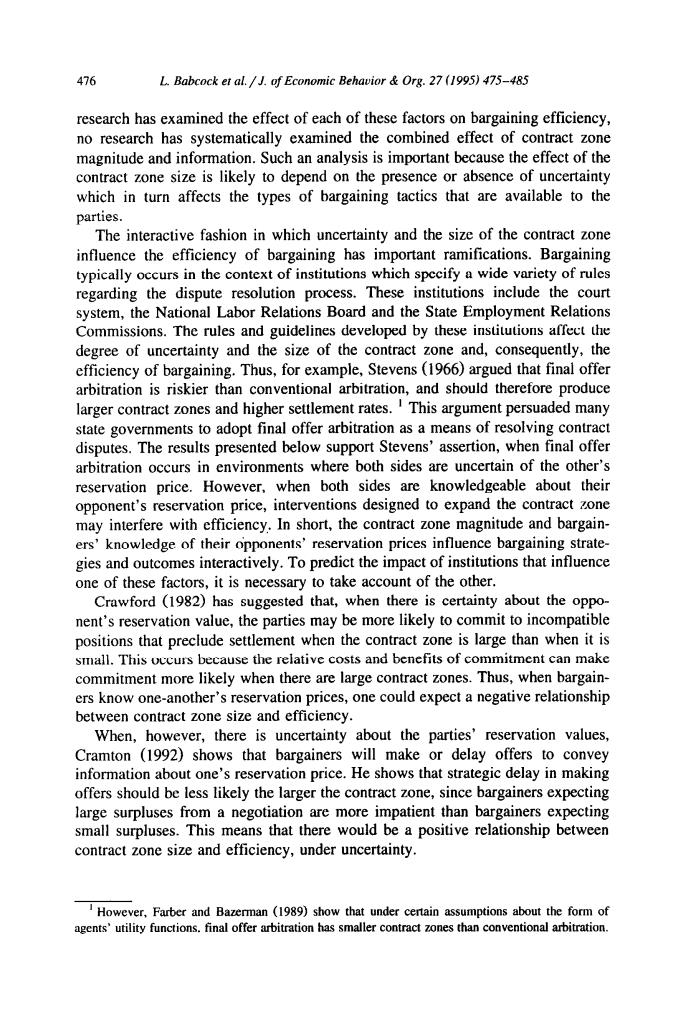正在加载图片...

476 LBabcock et al /J.of Economic Behavior Org.27(1995)475-485 research has examined the effect of each of these factors on bargaining efficiency, no research has systematically examined the combined effect of contract zone an analysis is bcause th ffec of the contract zone size is likely to depenc d on the prese e or absence of uncertainty which in turn affects the types of bargaining tactics that are available to the parties. The interactive fashion in which uncertainty and the size of the contract zone influence the effici ency of bargaining has typically occurs in the context of institutions ariety of rule regarding the dispute resolution process.These institutions include the court system,the National Labor Relations Board and the State Employment Relations Commissions.The rules and guidelines developed by these institutions affect the degree of uncertainty and the size of the contract zone and.consequently.the cy of ning.Thus,for ple,Stevens(1966) d that final offer arbitration is riskier than conventional arbitration and should therefore produce larger conract oes and higher seemetates.This argument persuaded many state governments to adopt final offer arbitration as a means of resolving contract outes.The results presented below support Stevens'assertion,when final offer arbitration occurs in environm s whe both sides are uncertain of the other's reservation price.However,when both sides are knowledge able about t thei opponent's reservation price,interventions designed to expand the contract zone may interfere with efficiency.In short,the contract zone magnitude and bargain- ers'knowledge of their opponents'reservation prices influence bargaining strate- gies and out mes interacti vely.To predict the ir npact of institutions that influence one of these fact tis necessa y to 、take acco nt of the other Crawford (1982)has suggested that,when there is certainty about the opp nent's reservation value,the parties may be more likely to commit to incompatible positions that preclude settlement when the contract zone is large than when it is nall.This y urs because the relative costs and benefits of commitment can make com mitment mo e likely when there are large contract zones.Thus,when bargain- ers know one-an the s reservatio pric s,one could expect a negative relationship between contract zone size and efficiency When,however,there is uncertainty about the parties'reservation values, Cramton (1992)shows that bargainers will make or delay offers to convey information about one's reservation price.He shows that strategic delay in making offers should be less likely the larger the contract zone,since bargainers expecting are more than ba gain n utedubino ala ie a negot contract zone size and efficiency,under uncertainty. agents'utility functions.fina s sm es than conventional arbitration476 L. Babcock et al. /J. of Economic Behavior & Org. 27 (1995) 475-485 research has examined the effect of each of these factors on bargaining efficiency, no research has systematically examined the combined effect of contract zone magnitude and information. Such an analysis is important because the effect of the contract zone size is likely to depend on the presence or absence of uncertainty which in turn affects the types of bargaining tactics that are available to the parties. The interactive fashion in which uncertainty and the size of the contract zone influence the efficiency of bargaining has important ramifications. Bargaining typically occurs in the context of institutions which specify a wide variety of rules regarding the dispute resolution process. These institutions include the court system, the National Labor Relations Board and the State Employment Relations Commissions. The rules and guidelines developed by these institutions affect the degree of uncertainty and the size of the contract zone and, consequently, the efficiency of bargaining. Thus, for example, Stevens (1966) argued that final offer arbitration is riskier than conventional arbitration, and should therefore produce larger contract zones and higher settlement rates. ’ This argument persuaded many state governments to adopt final offer arbitration as a means of resolving contract disputes. The results presented below support Stevens’ assertion, when final offer arbitration occurs in environments where both sides are uncertain of the other’s reservation price. However, when both sides are knowledgeable about their opponent’s reservation price, interventions designed to expand the contract zone may interfere with efficiency: In short, the contract zone magnitude and bargainers’ knowledge of their opponents’ reservation prices influence bargaining strategies and outcomes interactively. To predict the impact of institutions that influence one of these factors, it is necessary to take account of the other. Crawford (1982) has suggested that, when there is certainty about the opponent’s reservation value, the parties may be more likely to commit to incompatible positions that preclude settlement when the contract zone is large than when it is small. This occurs because the relative costs and benefits of commitment can make commitment more likely when there are large contract zones. Thus, when bargainers know one-another’s reservation prices, one could expect a negative relationship between contract zone size and efficiency. When, however, there is uncertainty about the parties’ reservation values, Cramton (1992) shows that bargainers will make or delay offers to convey information about one’s reservation price. He shows that strategic delay in making offers should be less likely the larger the contract zone, since bargainers expecting large surpluses from a negotiation are more impatient than bargainers expecting small surpluses. This means that there would be a positive relationship between contract zone size and efficiency, under uncertainty. ’ However, Farber and Bazerman (1989) show that under certain assumptions about the form of agents’ utility functions, final offer arbitration has smaller contract zones than conventional arbitration